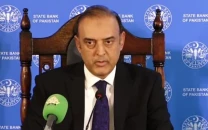Big names involved in oil crisis
Involved parties putting pressure, FIA tells cabinet body on energy

The Federal Investigation Agency (FIA) has informed the Cabinet Committee on Energy (CCOE) that big fish were involved in the June 2020 oil crisis that were putting pressure on the agency.
However, FIA officials said that Prime Minister Imran Khan had given the agency a free hand to catch the parties involved in the oil crisis.
The country had faced oil shortage in June last year when oil prices crashed due to corona-fuelled lockdowns.
A meeting of the CCOE, chaired by Federal Minister for Planning, Development and Special Initiatives Asad Umar, was held on Thursday.
“Whenever we call officials of oil marketing companies (OMCs) to probe the crisis, they build pressure on us and we receive calls from the high-ups,” said FIA officials.
However, they added that PM Khan had asked them to catch all the big names involved in the crisis to fix responsibility without bearing any pressure. They said that they were close to completing the inquiry report.
The committee expressed concern over the delay in report finalisation. However, the FIA told the committee about the progress made so far and assured it that substantial progress on the findings would be shared by the end of September.
During the meeting, Umar expressed serious concern over the delay in completing the report. He raised the issue that the deadline had passed but the report had not been completed yet.
The prime minister had removed Nadeem Babar, special assistant to the PM on petroleum at the time, when the FIA launched its inquiry. The premier also removed the then petroleum secretary to conduct the inquiry in a transparent way.
The FIA was tasked to probe the June 2020 oil crisis and fix responsibility on those involved in it, which has not been completed so far.
Sources said that there had been cases of harassment of OMCs by the FIA.
Recently, representatives of the Oil Marketing Association of Pakistan (OMAP) approached Petroleum Secretary Dr Arshad to raise the issue of harassment by the FIA.
In a letter addressed to Energy Minister Hammad Azhar, the OMAP highlighted the issues being faced by the OMCs and also complained about the FIA.
It said that the oil industry of Pakistan was the largest sector that helped collect approximately Rs1,000 billion per year or 25% of the total taxes. The industry also supports more than a million people through more than 250,000 jobs.
In June 2020, it said that Pakistan witnessed what was termed the petrol crisis, when petrol was alleged to have vanished from the market. Much of what happened leading to the crisis has been covered in the inquiry commission’s report recently approved by the cabinet and placed on its website.
The findings of the inquiry commission report by the FIA DG are based on forensic data provided by the oil industry to the commission and nowhere does the report cite lack of available data or holding back of information by the industry.
The OMCs body said that the purpose of the report was to pinpoint what happened and to identify the way forward to prevent such a crisis in the future.
However, the normal day-to-day working of the OMCs is being seriously and adversely impacted due to the harassment by the FIA on the pretext of action in respect of the inquiry commission report.
The CEOs and senior management of the OMCs are not only being harassed and threatened, but the agency is also refusing to take the viewpoint presented by the OMCs.
They are also facing hurdles in the renewal/extension of their prevailing licences on the pretext of continuing FIA inquiry.
OMCs also said that those companies with provisional licences were facing problems in lifting products from the local refineries.
IGCEP
The CCOE approved the Indicative Generation Capacity Expansion Plan – known as IGCEP 2021-30, which focuses on new electricity generating projects on a least cost basis.
The IGCEP envisions the commissioning of a portfolio of new generation projects including many hydropower projects, Thar coal-based projects, K-3 nuclear power plant and over 4,000MW of solar and wind-based renewable energy projects.
About 88% of the total capacity increase from 2022 to 2030 will come from indigenous fuel and the balance is only for those projects that were committed prior to this government came to power.
Fossil fuel has more than 50% share in the generation capacity right now, however, in the 2022-30 period the share of fossil fuel will be only 25%. So, all new project commitments are based on indigenous fuel.
The Power Division presented the IGCEP 2021-30, an indicative annual plan prepared by the National Transmission and Dispatch Company (NTDC) as per the National Electricity Policy (NEP) approved by the CCI.
Under the approved IGCEP, the generation mix of 2022, which is dominated by fossil fuel, will shift to clean energy (hydel, solar, wind and nuclear) by the year 2030.
Moreover, for the same period, the indigenous fuel-based generation against the imported fuel-based generation is going to improve from 69% to 87% of the total fuel-based generation.
After detailed consultations with all the provincial governments, the CCOE approved the IGCEP 2021-30. All the federal and provincial projects already under implementation will be completed as per the commitments.
There was consensus on the principle of new generation capacity addition on a least-cost basis. Such planning will target optimum future capacity addition at the most affordable cost, ensuring the cheapest electricity for consumers.
Published in The Express Tribune, August 27th, 2021.
Like Business on Facebook, follow @TribuneBiz on Twitter to stay informed and join in the conversation.



















COMMENTS
Comments are moderated and generally will be posted if they are on-topic and not abusive.
For more information, please see our Comments FAQ